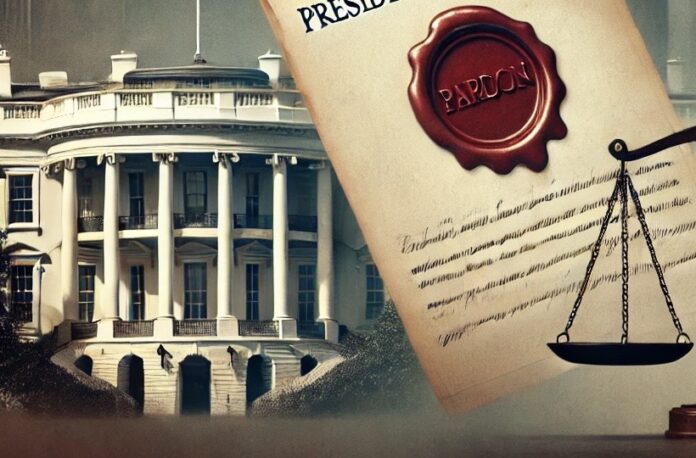Presidential pardons: they can be acts of mercy or a political lightning rod. Sometimes, they’re both. As Joe Biden wraps up his presidency with some eyebrow-raising clemency decisions—most notably pardoning his son, Hunter Biden—it’s worth looking at how his actions compare to other notorious pardons in U.S. history. Spoiler alert: he’s got competition, but his choices may go down as some of the most controversial ever.
A Quick Refresher: What Is the Pardon Power?
Presidents have the constitutional power to issue pardons and commutations for federal offenses. This authority is designed to provide a “check” on the judicial system, allowing for corrections of injustices and acts of clemency. But let’s be real: it’s also a tool of political power that’s been used (and abused) in ways that spark national outrage.
The Most Controversial Pardons in U.S. History
1. Richard Nixon (1974): “Healing the Nation” or Letting Him Off the Hook?
After Watergate, President Gerald Ford pardoned Richard Nixon for any crimes he might have committed during his presidency. Ford’s rationale was to help the country move on from a constitutional crisis, but many Americans viewed it as a blatant cover-up. The fallout? Ford’s approval ratings plummeted, and his re-election campaign floundered.
2. Marc Rich (2001): Clinton’s Parting Gift
On his final day in office, Bill Clinton pardoned financier Marc Rich, a fugitive who had fled the U.S. to escape charges of tax evasion and illegal oil trading. The scandal wasn’t just about Rich’s alleged crimes—it was about the appearance of impropriety. Rich’s ex-wife, Denise, had made substantial donations to the Clinton Library and the Democratic Party. While Clinton insisted the pardon wasn’t influenced by donations, the timing and secrecy left a stain on his legacy.
3. Chelsea Manning (2017): A Divided Nation
Barack Obama commuted Chelsea Manning’s sentence after she was convicted of leaking classified documents to WikiLeaks. Supporters called her a whistleblower who exposed government overreach. Critics argued the commutation undermined national security and emboldened other leakers. Whatever side you’re on, the decision was polarizing.
4. Joe Biden’s Hunter Biden Pardon (2024): Keeping It in the Family
And then we have Joe Biden. In December 2024, Biden pardoned his son, Hunter Biden, who faced federal charges related to tax fraud and alleged foreign business dealings. Biden framed the pardon as an act of compassion for a troubled family member. Critics, however, labeled it outright nepotism, a misuse of presidential power to protect his legacy. It’s not every day you see a presidential pardon this personal—and this contentious.
5. FALN Members (1999): Clinton Strikes Again
Bill Clinton makes the list twice. In 1999, he offered clemency to 16 members of the Armed Forces of National Liberation (FALN), a Puerto Rican nationalist group responsible for bombings that killed and injured civilians. Critics—including the FBI—argued the move was politically motivated to court Puerto Rican voters ahead of Hillary Clinton’s Senate campaign. The backlash was swift and bipartisan.
How Biden’s Pardons Stack Up
Joe Biden isn’t just pardoning family members; he’s issuing clemency at record-breaking levels. His administration’s last-minute clemency spree, including the commutation of sentences for 37 death-row inmates and over 1,500 non-violent offenders, has drawn sharp criticism.
1. Hunter Biden’s Pardon: Nepotism or Compassion?
The Hunter Biden pardon is the headline-grabber for obvious reasons. It’s a first in U.S. history: a sitting president pardoning his own child. While Biden’s supporters argue the pardon reflects his commitment to family and forgiveness, critics call it a blatant abuse of power that undermines trust in the judicial system.
2. Death-Row Commutations: Progressive Reform or Overreach?
Biden commuted the sentences of 37 federal death-row inmates, citing moral objections to capital punishment. While advocates for criminal justice reform praised the move, opponents argue it disrespects victims and circumvents the judicial process.
3. The 1,500 Clemencies: Too Much, Too Fast?
In a single day, Biden issued clemency to over 1,500 individuals, primarily non-violent offenders. While many view this as a long-overdue step toward reforming harsh sentencing laws, critics question the lack of individualized case reviews, suggesting it’s more about optics than justice.
Why Pardons Matter
Pardons aren’t just about individual cases—they’re about the message they send. They can reinforce public trust in the justice system or undermine it. When used judiciously, they highlight a president’s ability to show mercy. But when they’re seen as self-serving, they can tarnish legacies and fuel political division.
Final Thoughts: Mercy or Misstep?
Joe Biden’s clemency decisions, especially the pardon of Hunter Biden, are destined to be debated for years to come. Whether they represent compassion, political strategy, or outright favoritism depends on who you ask. What’s clear is that Biden’s pardons join a long tradition of controversial presidential clemency—one that often raises more questions than it answers.
As Donald Trump prepares to take office later this month, Biden’s pardons will likely remain a focal point of political and historical analysis. And if history tells us anything, the story of presidential pardons is far from over.




